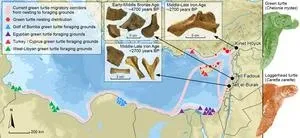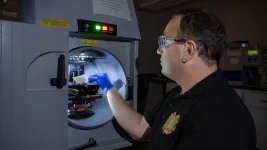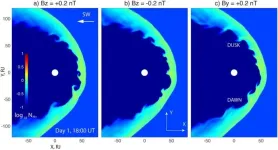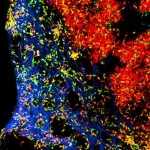(Press-News.org)
For approximately 3,000 years, generations of green sea turtles have returned to the same seagrass meadows to eat. This was discovered by Willemien de Kock, a historical ecologist at the University of Groningen, by combining modern data with archaeological findings. Sea turtles migrate between specific breeding places and eating places throughout their lives–this much was known. But the fact that this stretches over many generations highlights the importance of protecting seagrass meadows along the coasts of North Africa. The results were published in PNAS on July 17.
When young green sea turtles hatch, their parents have already left for a long journey. The little turtles clumsily make their way off the beach into the ocean and, not yet able to navigate the long migration of their parents, float around for years. During this time, they are not very picky eaters, omnivores even. Then, at about five years of age, they swim to the same area where their parents went, to eat a herbivore’s diet of seagrass.
Along the coasts of the eastern Mediterranean Sea, volunteers are active to protect the nests of the endangered green sea turtles. However, as Willemien de Kock explains: ‘We currently spend a lot of effort protecting the babies but not the place where they spend most of their time: the seagrass meadows.’ And crucially, these seagrass meadows are suffering from the effects of the climate crisis.
Analysing sea turtle bones
In the attic of the Groningen Institute of Archaeology at the University of Groningen, De Kock had access to boxes full of sea turtle remains from archaeological sites in the Mediterranean Sea area. The excavations were already done by her supervisor, Dr Canan Çakırlar. ‘All I had to do was dig in some boxes,’ De Kock says. By analysing the bones, De Kock was able to distinguish two species within the collection of bones: the green sea turtle and the loggerhead turtle.
De Kock was also able to identify what the sea turtles had been eating. This relied on a substance called bone collagen. By inspecting the bone collagen with a mass spectrometer, De Kock could detect what kind of plants the sea turtles must have eaten. ‘For instance,’ De Kock explains, ‘one plant might contain more of the lighter carbon-12 than another plant, which contains more of the heavier carbon-13. Because carbon does not change when it is digested, we can detect what ratio of carbon is present in the bones and infer the diet from that.’
Combining old and new
Modern satellite tracking data from the University of Exeter then provided De Kock with information on the current travelling routes and destinations of sea turtles. Researchers from Exeter had also been taking tiny samples of sea turtles’ skins, which revealed similar dietary information as De Kock found in bones. De Kock was, therefore, able to draw conclusions, connecting diets of millennia ago to specific locations. She found that for approximately 3,000 years, generations of green sea turtles have been feeding on sea grass meadows along the coasts of Egypt and West Libya. The results for loggerhead turtles were less specific because they had a more varied diet.
So, why is it relevant to know the eating habits of a species over many past generations? Because we collectively suffer from the shifting baseline syndrome: slow changes in a larger system, such as an animal population, go unnoticed because each generation of researchers redefines what the natural state was, as they saw it at the start of their careers. ‘Even long-term data goes back only about 100 years,’ says De Kock. ‘But tracing back further in time using archaeological data allows us to better see human-induced effects on the environment. And it allows us to predict, a bit.’ In fact, recent models have shown a high risk of widespread loss of seagrass in precisely these spots where green sea turtles have been going for millennia. Which could be detrimental to the green sea turtle, precisely because of its high fidelity to these places.
Reference: Willemien de Kock, Meaghan Mackie, Max Ramsøe, Morten E. Allentoft, Annette C. Broderick, Julia C. Haywood, Brendan J. Godley, Robin T. E. Snape, Phil J. Bradshaw, Hermann Genz, Matthew von Tersch, Michael W. Dee, Per J. Palsbøll, Michelle Alexander, Alberto J. Taurozzi, Canan Çakırlar. Threatened North African seagrass meadows have supported green turtle populations for millennia. PNAS, 17 July 2023.
Collaboration: This study was carried out by Willemien de Kock, using modern data from The Centre for Ecology and Conservation of the University of Exeter and archaeological material from Canan Çakırlar of the Groningen Institute of Archaeology at the University of Groningen. Lab work was carried out at the University of Copenhagen and the University of York.
END
University of Pittsburgh researchers have shown for the first time how Merkel cell polyomavirus (MCV), which causes an aggressive skin cancer called Merkel cell carcinoma, initiates DNA replication in host cells.
Published today in the journal PNAS, the study sheds light on the fundamental question of how viruses override their host cells’ carefully regulated DNA replicating system to make hundreds of new copies of themselves.
“Understanding how MCV replicates gives us really important clues about ...
Benjamin Franklin may be best known as the creator of bifocals and the lightning rod, but a group of University of Notre Dame researchers suggest he should also be known for his innovative ways of making (literal) money.
During his career, Franklin printed nearly 2,500,000 money notes for the American Colonies using what the researchers have identified as highly original techniques, as reported in a study published this week in the Proceedings of the National Academy of Sciences.
The research team, led by Khachatur ...
Research Highlights:
An analysis of more than two million adults in the U.S. found that present day heart failure risk was higher among Black adults who lived in zip codes historically impacted by redlining compared to Black adults living in non-redlined areas.
Redlining did not have the same impact on heart failure risk among white adults living in historically redlined zip codes.
Among Black adults living in historically redlined communities, approximately half of the excess risk of heart failure appeared to be explained by higher levels of socioeconomic distress.
Embargoed until 1 p.m. CT/2 p.m. ET Monday, July 17, ...
Black patients with implantable cardioverter defibrillators (ICDs) have a significantly higher burden of disease than white patients with the same device, according to a new study from University of Rochester Medical Center (URMC) cardiology researchers. Analyzing data from clinical trials conducted over a 20-year period by the Clinical Cardiovascular Research Center (CCRC) at URMC, investigators concluded that not only did Black patients with ICDs tend to be significantly younger than white patients, but they also had a higher ...
SAN ANTONIO — July 17, 2023 —A team led by Southwest Research Institute (SwRI) and The University of Texas at San Antonio (UTSA) has found that NASA’s Juno spacecraft orbiting Jupiter frequently encounters giant swirling waves at the boundary between the solar wind and Jupiter’s magnetosphere. The waves are an important process for transferring energy and mass from the solar wind, a stream of charged particles emitted by the Sun, to planetary space environments.
Jake Montgomery, a doctoral student in the joint space physics program ...
The cells of the immune system circulate mainly in the blood and migrate into the body's tissues after an inflammation. Some types of immune cells, however, are permanently located in the tissues, where they come together to form three-dimensional networks.
How do these networks form and how are they maintained? For the long-lived macrophages (phagocytes), the answer is already known: They settle in so-called niches. These are environments of connective tissue cells that supply the macrophages with nutrients and keep them ...
NEW YORK, NY--A pair of new studies led by researchers at Columbia University explains why babies get so many common respiratory infections and identifies a specialized cluster of immune cells found only in babies that help them better cope with new pathogens.
“We know little about how the immune system develops throughout life, and most of what we know about immune system development in children comes from animal studies,” says Donna Farber, PhD, an expert in immune system development at Columbia University ...
ANN ARBOR, Mich. – For many busy families, online access to a child’s health provider for medical advice, health records or prescription refills is likely a convenient option.
Yet, only 43% of parents have set their child up for a patient portal – an online tool allowing communication between patients and medical providers – and others may not be optimizing portal use, suggests the University of Michigan Health C.S. Mott Children’s Hospital National Poll on Children’s Health.
“Patient portals offer a wide range of benefits, including decreasing unnecessary hassles for providers and patients and improving access to both the medical ...
FOR IMMEDIATE RELEASE
Monday, July 17, 2023
Contact:
Jillian McKoy, jpmckoy@bu.edu
Michael Saunders, msaunder@bu.edu
##
The Missing Americans: Unprecedented US Mortality Far Exceeds Other Wealthy Nations
A new study found that more than one million US deaths a year—including many young and working-age adults—could be avoided if the US had mortality rates similar to its peer nations.
In 2021, 1.1 million deaths would have been averted ...
As the world's population continues to grow, ensuring access to clean and safe water has become an increasingly important concern, yet little is known about how surface water quality will change in the future. Recent scientific research has shed light on the potential challenges that surface water quality may face in the coming years, particularly in Sub-Saharan Africa. “While surface water quality is projected to improve in most developed countries, there is an important caveat: the outlook for the poorest nations is bleak”.
A recent study, published in Nature Water, has projected an increase in surface water pollution in Sub-Saharan Africa. These findings ...






